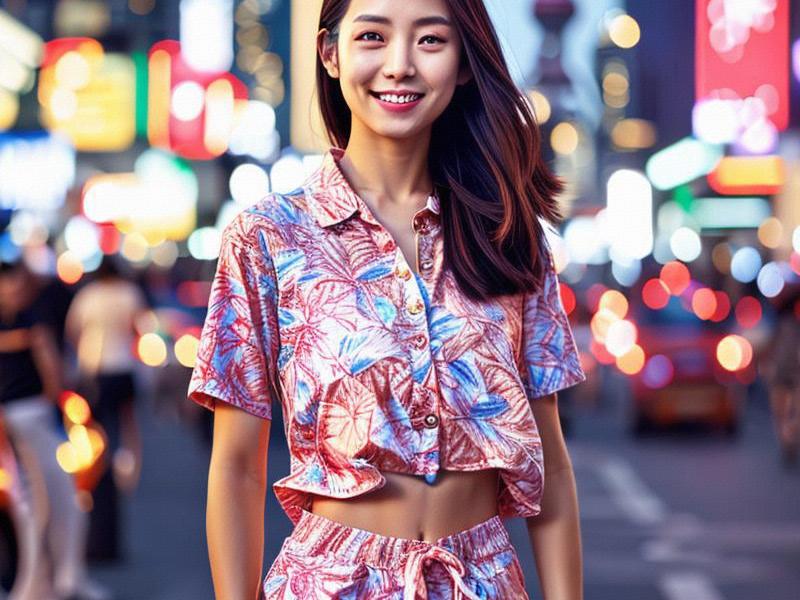This article delves into the unique beauty culture of Shanghai, exploring its historical roots, modern trends, and the factors that make it a global hub for beauty and fashion.

Shanghai, a city that has long been a symbol of modernity and elegance in China, is not only a financial and commercial powerhouse but also a significant player in the world of beauty and fashion. The city's beauty culture is a fascinating blend of traditional aesthetics and contemporary trends, reflecting its rich history and dynamic spirit.
The roots of Shanghai's beauty culture can be traced back to the late 19th and early 20th centuries, during the period known as the "Shanghai Bund" era. This was a time when the city became a cosmopolitan center, attracting people from all over the world. The influx of Western influence brought with it new ideas about beauty, fashion, and personal grooming. The Bund, with its luxurious hotels, theaters, and department stores, became a melting pot of cultures, where Eastern and Western beauty ideals began to intertwine.
One of the most iconic symbols of Shanghai's beauty culture is the cheongsam, or qipao. This traditional Chinese dress, with its high collar, fitted bodice, and flowing skirt, was popularized in Shanghai during the 1920s and 1930s. The cheongsam became a symbol of modern Chinese women's fashion, embodying a blend of traditional Chinese elegance and Western-style tailoring. Today, the cheongsam is still a popular choice for special occasions, and many designers in Shanghai continue to reinterpret this classic garment with modern twists.
In addition to clothing, Shanghai's beauty culture is also reflected in its cosmetics and skincare industry. The city has a long history of producing high-quality traditional Chinese medicines and skincare products. Modern Shanghai has embraced this heritage, combining it with advanced scientific research to crteeainnovative beauty products. Brands like Dr. Yu Skin Care and Bioderma have gained international recognition for their high-quality, effective products.
上海花千坊龙凤
Shanghai's beauty culture is not just about physical appearance; it also encompasses a broader lifestyle and attitude. The city is known for its vibrant nightlife, sophisticated dining scenes, and a strong emphasis on personal grooming and fashion. Shanghai women are often admired for their confidence and style, which they express through their choice of clothing, makeup, and overall demeanor.
One of the key factors that contribute to Shanghai's status as a global beauty hub is its fashion and beauty events. The city hosts numerous international fashion shows, beauty exhibitions, and trade fairs throughout the year. Events like the Shanghai Fashion Week and the China International Beauty Expo attract designers, beauty professionals, and industry leaders from around the world. These events not only showcase the latest trends and innovations but also provide a platform for networking and collaboration.
The influence of Shanghai's beauty culture extends beyond its borders. Chinese beauty brands are increasingly making their mark on the global stage, with many of them headquartered in Shanghai. Brands like L'Oréal China, Estée Lauder China, and Shanghai Jahwa are at the forefront of the beauty industry, offering a wide range of products that cater to diverse consumer needs. These brands are not only popular in China but also have a significant presence in international markets.
上海娱乐
The rise of social media has also played a crucial role in promoting Shanghai's beauty culture. Platforms like WeChat, Instagram, and TikTok have become powerful tools for beauty brands and influencers to reach a global audience. Shanghai-based beauty influencers, known as "beauty bloggers," have gained immense popularity for their reviews, tutorials, and product recommendations. Their influence has helped shape consumer preferences and drive the growth of the beauty industry in China.
Sustainability is another important aspect of Shanghai's beauty culture. As awareness about environmental and social issues grows, many beauty brands in Shanghai are adopting sustainable practices. This includes using eco-friendly materials, reducing waste, and ensuring fair labor practices. Consumers in Shanghai are increasingly conscious of the impact of their purchasing decisions, and they are willing to pay a premium for products that align with their values.
The city's beauty culture is also shaped by its diverse population. Shanghai is home to people from all over China and the world, each bringing their own unique beauty traditions and preferences. This diversity has enriched the city's beauty scene, creating a vibrant and inclusive environment where different styles and ideas can coexist and thrive.
上海品茶工作室
Education and training play a vital role in nurturing talent in Shanghai's beauty industry. The city is home to several prestigious institutions that offer programs in fashion design, cosmetology, and beauty therapy. These institutions provide students with the skills and knowledge they need to succeed in the competitive beauty industry. Many graduates go on to work for leading beauty brands, contribute to the development of new products, or start their own businesses.
The government of Shanghai also recognizes the importance of the beauty industry and has taken steps to support its growth. Initiatives like the Shanghai Beauty Industry Park provide a centralized location for beauty-related businesses to set up shop. The park offers state-of-the-art facilities, networking opportunities, and access to government support programs. This has helped attract both domestic and international companies to the city, further strengthening Shanghai's position as a global beauty hub.
In conclusion, Shanghai's beauty culture is a dynamic and multifaceted phenomenon that reflects the city's rich history, diverse population, and innovative spirit. From traditional aesthetics to modern trends, Shanghai continues to be a leader in the beauty and fashion industry. Its ability to blend the old with the new, while remaining true to its cultural roots, is what makes it so unique and attractive. As the city continues to evolve, its beauty culture will undoubtedly play an even more significant role in shaping the global beauty landscape.